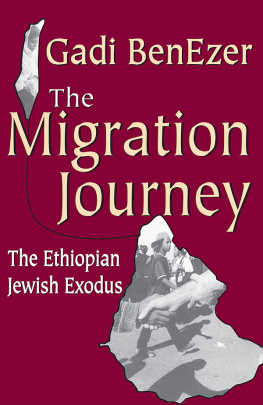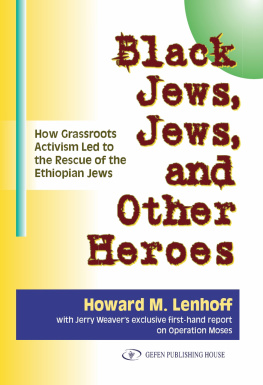Ethiopian Jewish
Immigrants in Israel
Ethiopian Jewish
Immigrants in Israel
The Homeland Postponed
Tanya Schwarz
First published 2001 by Curzon Press
Published 2016 by Routledge
2 Park Square, Milton Park, Abingdon, Oxon 0X14 4RN
711 Third Avenue, New York, NY 10017, USA
Routledge is an imprint of the Taylor & Francis Group, an informa business
Copyright 2001 Tanya Schwarz
Typeset in Photina by LaserScript Ltd, Mitcham, Surrey
All rights reserved. No part of this book may be reprinted or reproduced or utilised in any form or by any electronic, mechanical, or other means, now known or hereafter invented, including photocopying and recording, or in any information storage or retrieval system, without permission in writing from the publishers.
Notice:
Product or corporate names may be trademarks or registered trademarks, and are used only for identification and explanation without intent to infringe.
Credits and acknowledgments borrowed from other sources and reproduced, with permission, in this textbook appear on appropriate page within text.
British Library Cataloguing in Phublication Data
A catalogue record of this book is available from the British Library
Library of Congress Cataloguing in Publication Data
A catalogue record for this book has been requested
ISBN: 9781138969025 (pbk)
I dedicate this book to my family Walter, Dorothy, Tanya, Habie, Simon, Ben, Frederique, Zoe, Zac, Chloe, Max, and No with appreciation for your ongoing support, however far I go from you.
I thank the Economic and Social Research Council for a Postgraduate Research Award and generous fieldwork allowance that enabled me to pursue the research required for this book. I thank the Royal Anthropological Institute (Radcliffe-Brown/Sutasoma Award) and the London School of Economics (Malinowski Memorial Fund) for additional support. In addition, I thank Emma Rothschild at the Centre for History and Economics, Kings College. Cambridge for funding a preliminary year of post-graduate study.
In Israel, my Ethiopian adoptive family and neighbours and the Ethiopian Jewish community as a whole received me with boundless courtesy and hospitality. They rarely tired of my questions and allowed me to share their joys and sorrows for close to two years. My adoptive father became a veritable parent, cherishing me and guiding me, and I formed close friendships with many of his relatives and neighbours. I learned much from Ethiopian Jews on a personal level; their grace, hospitality, and remarkable ability to adapt to a totally new lifestyle, remain a source of inspiration. It is impossible to adequately thank them.
Several non-Ethiopians helped to make fieldwork enjoyable. Shmulick Porat, a tireless community worker, shared much of his insights and knowledge of Ethiopian Jews. Jonathan Miran and researchers Dr Chaim Rosen, Dr Steven Kaplan and Dr Lisa Anteby, foremost experts on Ethiopian Jewry, offered me friendship, guidance and encouragement. My relatives in Israel, and my friend Sarojini Vittachi in Jordan, provided welcome breaks.
In Ethiopia, I was received regally by my Ethiopian Israeli adoptive familys former neighbours in the village of Gomange Mariam, Gondar. I travelled in Ethiopian villages for over two months, and I thank all my hosts there, as well as Dr Alula Pankhurst and Dr Rick Hodes for welcoming me into their homes in Adis Abeba.
Without the inspiration and encouragement of my supervisor, Professor Maurice Bloch, the PhD thesis which led to this book would not have been started, and never completed. He has greatly enhanced the quality of my work and I owe him an enormous debt. Dr David Lan generously contributed his enthusiasm and anthropological perceptions. Dr Michael Stewarts approach to anthropology has influenced my own, and his critical insight and encouragement over the years have been invaluable, I also thank the staff and postgraduate students of the LSE Anthropology Department, London, for a stimulating environment in which to conduct research. My PhD thesis examiners, Drs Charles Stewart and Tom Selwyn encouraged me to publish and made several useful suggestions. Drs Steven Kaplan and Lisa Anteby both generously commented on the PhD thesis, and pointed out a number of errors. I am extremely grateful to Dr Tudor Parfitt for commissioning this book and for his editorial assistance.
I wrote my manuscript in idyllic conditions thanks to the generous hospitality of my aunt Tanya Morgan, my grandmother Cissie Morgan, and my friend Josh Mailman, in whose homes I lived, and to friends and family who periodically hosted me and my computer in their beautiful homes in the French, English, South African and Mozambican countryside.
My family and friends, and my parents and elder sister in particular, have been invaluable to me throughout this project. Special thanks to my army of proof-readers for the PhD thesis: my parents, my sisters. Miranda, Tom, Tom II, Tom III, Matthew, Lucy, Kenny, Daniel and Maya. And thanks to Kenny for filling the last year of my thesis-writing with love, lyrics, laughter, and lots of emails. For the book, I thank my parents and Edwin for their editorial help and loving encouragement.
Finally, I thank my beloved Niall for carting the proofs to and from London and Johannesburg, and for sharing with me the excitement of the final months prior to publication.
The time had arrived to return to Jerusalem, and reclaim the inheritance of their ancestors. All shared in this hope of speedy redemption, and a crowd of poor, simple-minded individuals resolved to start for Jerusalem In less time than is required in Europe to get ready for a short excursion, a sizeable group of Falashas had started to go to Jerusalem
This group of Ethiopian Jews, which set off on foot for Jerusalem in the early 1860s, never reached their destination: the hoped-for miracle that aided Moses flight from Egypt, the parting of the Red Sea, failed to materialise. Many members of the group perished on the journey, others settled beyond the reach of the European Protestant Missionaries they were fleeing, Over one hundred years later, a miracle of a different kind assisted their descendants: in huge jumbo-jets sent by the state of Israel, they reached the promised land.
The Ethiopian Jews, otherwise known as Beta Israel, have long captured the Western imagination ever since Jewish envoys, travelling in Ethiopia in the 1860s, brought back reports of Black Jews, apparently direct descendants of ancient Israelites, who retained a strict form of Biblical Judaism in the midst of primitive Africans. In recent years, the Beta Israel made the headlines when the Israeli government conducted two airlifts into Israel, bringing six thousand seven hundred from Sudanese refugee camps in 1984, and another fourteen thousand from Addis Abeba, in only thirty-six hours, in May 1991.
The Ethiopian Jews soon found that Israel was not the Jerusalem of their dreams. Although their living standards soared and their children were educated they felt that, as in Ethiopia, they were cast in the bottom strata of society. Their customs, the colour of their skin even their Jewishness were devalued in Israel. Like many other immigrant groups, the Ethiopian Jews of Israel feel they are losing control of their lives and losing influence on their children who speak Hebrew while they speak only Amharic. In their bewilderment, they say that they are becoming deaf.








